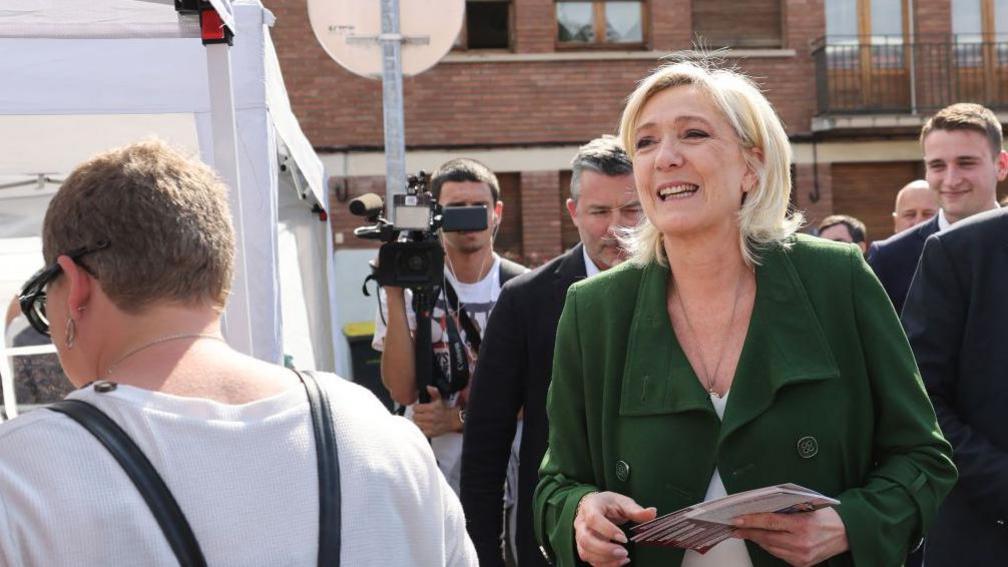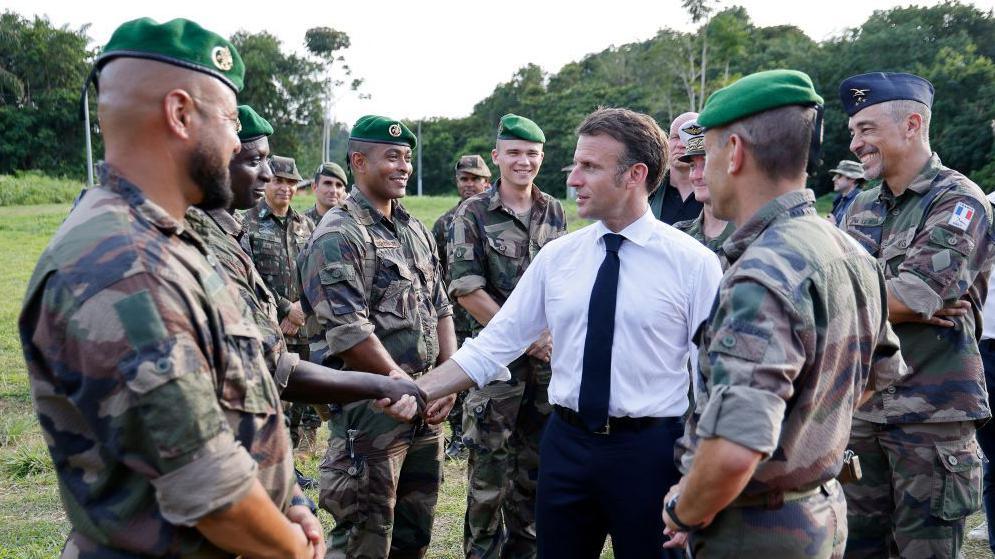Le Pen threatens to challenge Macron's army powers

Marine Le Pen wants Jordan Bardella to be France's next prime minister
- Published
The leader of France's far-right National Rally, Marine Le Pen, has warned that President Emmanuel Macron will not be able to send troops to Ukraine as army chief if her party forms the next government.
"Armed forces chief, for the president, is an honorary title as it's the prime minister who controls the purse strings," National Rally's leader in parliament said in a newspaper interview.
France votes on Sunday in the first of two rounds of snap parliamentary elections.
Latest opinion polls suggest National Rally could win a potential 36% of the vote, although it may fall short of the absolute majority it needs to control parliament.
As president, Mr Macron is commander in chief and traditionally plays a key role in his country's international and defence policy.
He has been among Europe's strongest leaders in support of Ukraine since Russia's full-scale invasion, and he has refused to rule out sending troops "if Russia decided to go further", stressing that Russia cannot win in Ukraine. He has since been backed by a handful of other countries.
But Ms Le Pen has told local newspaper Le Télégramme she believes that if National Rally (RN) leader Jordan Bardella becomes France's next prime minister then the president's powers would be reduced.
"Jordan has no intention of picking a quarrel with him but he has put down red lines - the president won't be able to send troops," she explained.
- Published26 June 2024
- Published30 June 2024
If RN wins an absolute majority in parliament, she says Mr Macron would have little choice but to appoint her party's 28-year-old leader. That would mean power-sharing - known in France as cohabitation - between a president and government from a separate party, not seen in the country since 2002.
Without the 289 seats needed for an absolute majority in the National Assembly, Mr Bardella has said he will not be prime minister of a hung parliament.
The latest opinion poll - with a sizeable sample of almost 12,000 voters - suggests National Rally could win a potential 36% of the vote, reinforced by a number of candidates it is backing from the conservative Republicans.
The deputy head of pollster Ipsos, Brice Teinturier, says the poll shows "an incredibly powerful RN bloc".
With the vote only three days away, one of France's biggest sporting figures, Victor Wembanyama, has spoken out about the election.
"Of course, political choices are personal," the 19-year-old NBA basketball star told reporters. "But for me it is important to take a distance from extremes, which are not the direction to take for a country like ours."
Last week France football captain Kylian Mbappé called on young voters to reject "extremists", who he said were "at the gates of power".
The left-wing New Popular Front is lying in second place beyond National Rally, and Mr Macron's Ensemble alliance is trailing in third.
Macron ally François Bayrou has accused Ms Le Pen of questioning the president's powers under the French constitution of appointing the state's civil and military positions, presiding over the armed forces and defence council.
Ms Le Pen went on X to say she was not calling into question the president's power to send troops abroad, merely that the prime minister "has by control of the budget, the means to oppose it".
Ukraine's Volodymyr Zelensky has expressed confidence that France will continue to support Kyiv after the elections and the next government will "continue to comprehensively support Ukraine both on the battlefield and on our historically irreversible path to the EU".

As president, Emmanuel Macron is commander in chief of the armed forces (file pic)
Jordan Bardella said in a head-to-head TV debate this week that his party would continue supporting Ukraine, but would not send long-range missiles or French troops.
The RN has long had close ties with Russia, and changed its position when the Russian invasion took place in 2022.
Mr Macron has been widely criticised for calling the two-round parliamentary elections out of the blue earlier this month, an hour after it became clear that Mr Bardella's party had won European elections.
Several of his own allies have openly challenged his decision to call snap elections, and Prime Minister Gabriel Attal has been left to fight a campaign when his Ensemble alliance's poll ratings are struggling.
The high cost of living is seen as the main issue for voters, although immigration is not far behind, which is a big focus of National Rally's programme.